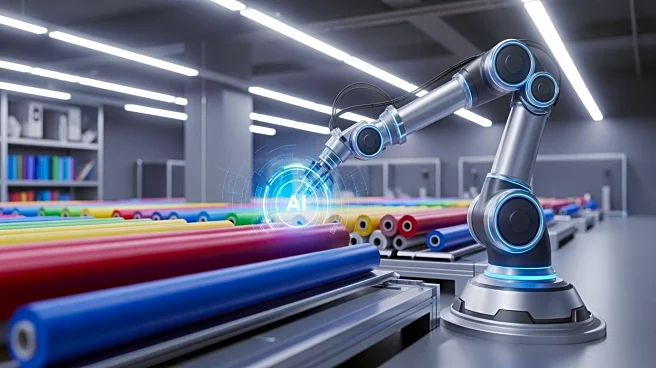What's Happening?
AI agents are increasingly being utilized in the fashion and retail sectors to streamline back-office operations. Companies like Walmart have pioneered the use of AI agents to automate tasks such as HR
transactions and merchandising performance summaries. These agents leverage large language models to autonomously plan and execute tasks, reducing the need for human intervention in routine processes. While AI agents are not yet capable of handling highly complex jobs, they are being used to automate repetitive tasks and improve efficiency. The technology is rapidly advancing, with companies like Salesforce offering platforms that allow businesses to create their own agents to manage tasks such as inventory replenishment and marketing campaigns.
Why It's Important?
The integration of AI agents in back-office operations represents a significant shift in how businesses manage their internal processes. By automating routine tasks, companies can reduce labor costs and increase efficiency, potentially leading to job displacement in certain roles. However, this technology also creates opportunities for new types of jobs focused on managing and developing AI systems. The adoption of AI agents could lead to more streamlined operations and improved decision-making capabilities, giving companies a competitive edge in the market. As AI technology continues to evolve, its impact on the workforce and business operations will likely grow, necessitating adaptation and reskilling of employees.
What's Next?
As AI agents become more sophisticated, their capabilities are expected to expand, allowing them to handle more complex tasks and integrate more deeply into business operations. Companies are likely to continue investing in AI technology to stay competitive, leading to further advancements and adoption across various industries. The rapid pace of AI development suggests that businesses will need to remain agile and proactive in integrating these technologies to avoid being left behind. Additionally, there may be increased focus on ethical considerations and regulatory frameworks to ensure responsible use of AI in business settings.
Beyond the Headlines
The rise of AI agents in business operations raises important ethical and legal questions regarding data privacy, job displacement, and the transparency of AI decision-making processes. As companies increasingly rely on AI to make decisions, there is a need for clear guidelines and accountability measures to ensure that these technologies are used responsibly. The potential for AI to reshape the workforce also highlights the importance of reskilling and upskilling programs to prepare employees for the changing job landscape. Long-term, the integration of AI agents could lead to a more efficient and innovative business environment, but it will require careful management to balance technological advancement with societal impacts.










